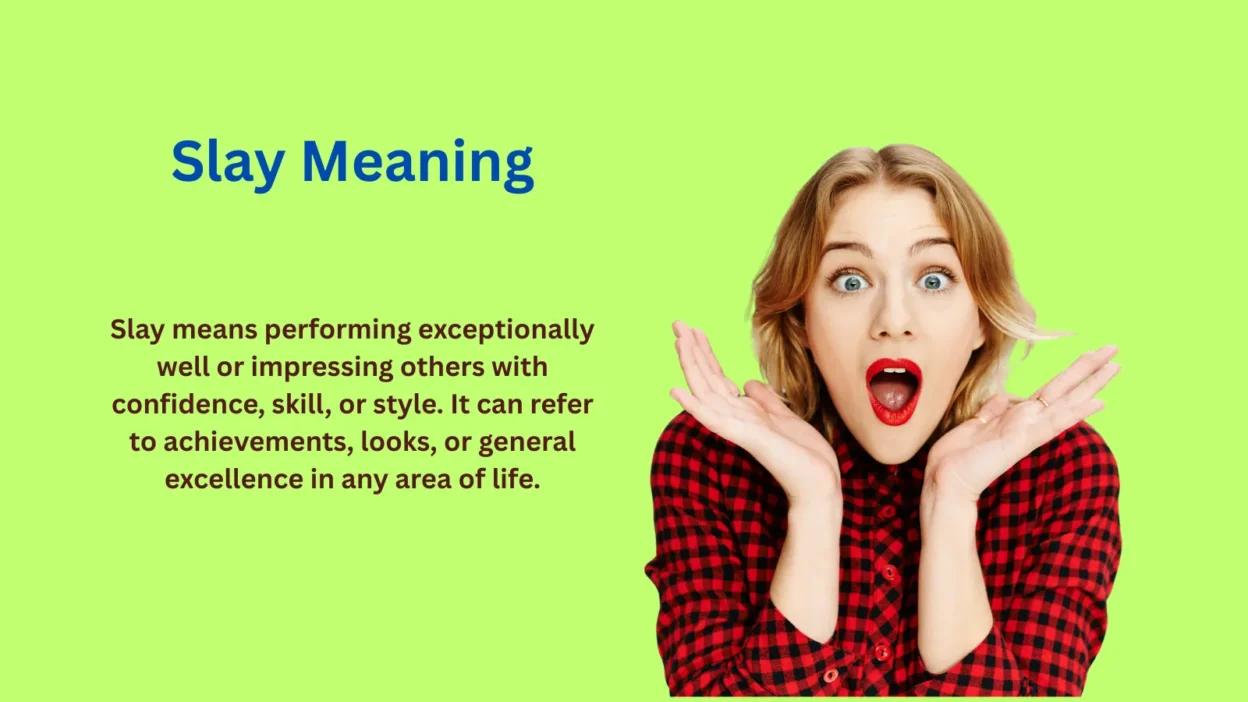From TikTok videos to Instagram captions, Slay Meaning has become a popular term in online culture. Slay is used to describe someone doing something exceptionally well, looking snatched, or achieving success with style. It reflects confidence, empowerment, and admiration — from fashion and makeup to performances and personal accomplishments.
People often use the term in everyday life, for example:
- “She totally slayed her presentation today!”
- “Look at her outfit—she’s a slay queen!”
In this article, we’ll explain what Slay means, explore its origin, show how it’s used in different contexts, and share examples that highlight its popularity in modern culture.
What Does Slay Mean?
Slay means performing exceptionally well or impressing others with confidence, skill, or style. It can refer to achievements, looks, or general excellence in any area of life.
Example Sentences:
- “He slayed his dance performance at the competition.”
- “Slay your goals this year with determination and style.”
Key Points to Remember:
- Slay = to impress, dominate, or excel at something.
- It promotes confidence, empowerment, and admiration.
- Common in fashion, entertainment, social media, and daily life.
- Slay is both a verb and a slang term widely recognized online.
Background & History
The term “slay” originated in English as a standard verb meaning “to kill.” Its modern slang usage, meaning “to excel or impress,” emerged in African American Vernacular English (AAVE) and LGBTQ+ communities in the 2000s.
- Early Usage: Used in drag and ballroom culture to celebrate style and confidence.
- Pop Culture Influence: Artists like Beyoncé, Lady Gaga, and RuPaul popularized it in music, performances, and media.
- Social Media Era: Slay became mainstream on Instagram, TikTok, and Twitter to praise someone’s appearance, talent, or achievements.
Today, slay symbolizes excellence, confidence, and empowerment in online and offline contexts.
Usage in Various Contexts
Slay is versatile and used in texting, social media, and even professional spaces to show admiration.
In Texting:
- “You slayed that exam, congrats!”
- “Slay queen 👑, your outfit is everything!”
On Social Media:
- Hashtags like #Slay, #SlayQueen, #SlayTheDay are common.
- Example: “New look for the weekend! #Slay #OOTD #FashionGoals.”
In Gaming:
- Used to complement skillful gameplay or winning streaks.
- Example: “You slayed that boss battle solo!”
Professional Contexts:
- Less common, but can be used casually to praise a colleague’s achievement.
- Example: “You slayed that client presentation—well done!”
Common Misconceptions & Clarifications
- “Slay only refers to appearance.”
False. It can refer to achievements, skills, or general excellence. - “Slay is informal and inappropriate.”
Mostly informal, but widely accepted in casual and creative contexts. - “You must be perfect to slay.”
Not at all. Slaying is about confidence, effort, and impact, not perfection.
Example Dialogue:
- Mia: “I don’t think I slayed today.”
- Jake: “Yes, you did! Confidence counts just as much as skill!”
Similar Terms & Alternatives
Here are a few related expressions often used instead of slay:
| Term | Meaning | Use Example |
|---|---|---|
| Crush it | Doing exceptionally well | “You crushed that presentation!” |
| Kill it | Succeeding impressively | “She killed it on stage tonight.” |
| Own it | Confidence in success | “Own it! You’re amazing at this.” |
| Nail it | Performing perfectly | “You nailed that recipe—so delicious!” |
| Boss | Commanding respect or skill | “He’s a boss at marketing campaigns.” |
Each term conveys excellence, but slay emphasizes style, confidence, and empowerment.
How to Respond to This Term
When someone says you “slayed” something, your response can vary:
Casual:
- “Thanks! I worked hard for it!”
- “Slay energy activated 👏.”
Funny:
- “Slayed? More like survived 😂.”
- “Slay or nap? Today I chose slay!”
Professional:
- “Appreciate the feedback. Glad it went well.”
Privacy-conscious:
- “Thank you! That means a lot.”
Responding with gratitude and confidence is key.
Regional or Cultural Differences
Slay is recognized globally, but usage differs slightly:
- US & UK: Common in pop culture, social media, and entertainment.
- Japan & Korea: Used in online communities to complement looks or skills.
- Pakistan & India: Increasingly popular among youth for social media and fashion posts.
- Europe: Mainly used in influencer culture and LGBTQ+ communities.
Across regions, slay always signals admiration, empowerment, and excellence.
Comparison with Similar Terms
| Expression | Focus | Difference from Slay |
|---|---|---|
| Crush it | Success in action | Slay emphasizes style and confidence too |
| Kill it | Skill or performance | Slay is more celebratory and empowering |
| Own it | Confidence | Slay is achievement + style |
| Nail it | Precision | Slay adds flair and attitude |
Slay blends skill, confidence, and style, while others may focus purely on performance.
Usage in Online Communities & Social Media
TikTok, Instagram, Twitter:
- Users praise others with “slay” for looks, achievements, or performances.
- Example hashtags: #SlayQueen, #SlayTheDay, #SlayAllDay
In Gaming:
- Players say “slay” to compliment exceptional moves or victories.
In Fashion & Beauty:
- Slay describes outfits, makeup, or overall style:
- Example: “This looks? Absolute slay 👗🔥.”
Hidden or Offensive Meanings
Slay is generally positive and empowering.
However, sarcasm can invert it: “Wow, you really slayed… said no one ever.”
Tone, context, and emojis usually clarify intent.
Suitability for Professional Communication
Slay is acceptable in casual, creative, or informal professional settings (marketing, design, entertainment).
For formal contexts, use alternatives like:
- “Excellent performance”
- “Outstanding achievement”
- “Impressive execution”
Example:
- Instead of “You slayed the project,” say “Your execution on the project was outstanding.”
FAQs
- What does slay mean?
Slay means to do something exceptionally well or impress others with confidence and style. - Is slay slang or formal?
Informal, mostly used in casual and social media contexts. - Why is Slay popular?
It celebrates confidence, skill, and empowerment. - Can slay refer to looks?
Yes, it can refer to fashion, appearance, performance, or achievement. - Can I say slay in professional settings?
In casual or creative workplaces, yes. Use formal alternatives for corporate contexts. - Is slay always positive?
Mostly, but sarcasm can be used to imply the opposite.
Conclusion
Slay meaning goes beyond a simple compliment — it’s a celebration of confidence, skill, and style. From rocking a fashion look to excelling in a performance, slay inspires admiration and empowerment.
If you’re posting on social media, chatting with friends, or achieving personal goals, remember: to slay is to shine with confidence and style.





